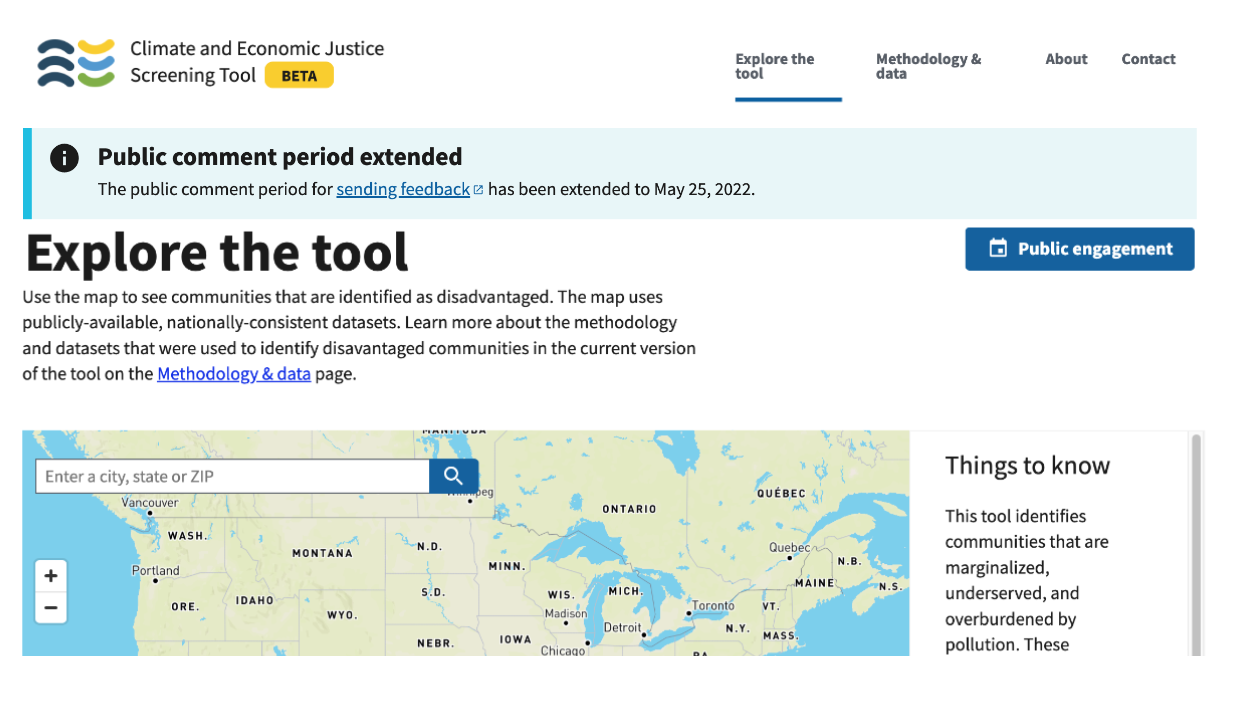Image shows the beta version of the federal Climate and Economic Justice Screening Tool.
EDGI Urges CEQ to Incorporate Federal Enforcement Data into Climate and Economic Justice Screening Tool
In response to the call for public comments, EDGI calls on the Council on Environmental Quality to go further to address root causes of environmental racism.
April 28, 2022 — On Monday, April 25, 2022, the Environmental Data & Governance Initiative (EDGI) submitted a public comment to the Council on Environmental Quality (CEQ) on the beta version of the Climate and Economic Justice Screening Tool (CEJST). This tool is a response to Biden’s executive order directing agencies to prioritize investments in disadvantaged communities and the White House Environmental Justice Advisory Council’s (WHEJAC) recommendations for identifying disadvantaged communities.
EDGI conducted an extensive analysis of US federal datasets in order to assess use of the CEJST tool for identifying disadvantaged communities. EDGI’s public comment makes recommendations based on this analysis, noting in particular that CEJST does not include any indicators of compliance with and enforcement of environmental protection laws. Unequal distribution of enforcement and compliance is a fundamental aspect of environmental racism that must be addressed. Additionally, EDGI urges CEQ to move toward identifying solutions by identifying root causes of harm.
Specifically, EDGI recommends the final tool include the following:
- An expanded list of communities based on the inclusion of criteria related to the enforcement of and compliance with environmental protection laws. EDGI proposes an additional 107 tracts based on enforcement and compliance indicators. These tracts have more violations per regulated facility than those currently listed in the CEJST.
- An evaluation of industrial sectors within tracts identified as disadvantaged. EDGI finds many CEJST tracts are home to fossil-fuel facilities, including coal-fired power plants and natural gas pipeline facilities. Specifically, EDGI found fossil fuel-related industries present in nearly 4 out of every 5 tracts that CEJST identified as disadvantaged. CEJST should make it easy for the public to see these underlying patterns. Addressing root causes–fossil fuel use in this case–is an essential component of environmental justice and points the way to potential solutions. Additionally, Biden’s Justice40 initiative could prioritize investments in community-level energy transitions, facilitating the phasing out of fossil fuel infrastructures that harm communities.
- A list prioritizing communities based on additional enforcement and compliance indicators. EDGI finds that 1,025 out of the 23,470 tracts already identified (4%) could be considered priorities based on limited enforcement of environmental protection laws and/or limited industry compliance with them.
“If we are serious about addressing what causes higher rates of toxic exposures and climate risks, then we must highlight some of their proximate causes in limited enforcement and compliance,” reads the comment. “A community that has particularly high exposures or risks while also not being served by government agencies is a priority for investment and action.”
The CEQ has extended the deadline for comment on the CEJST until May 25. Any groups or individuals interested in commenting on the tool can see CEQ’s call for comments here.
CONTACT: The members of EDGI who researched and wrote this public comment are available to answer media, academic, or community questions. Please contact EDGI communications lead Shannan Lenke Stoll at ShannanStoll.edgi@gmail.com with any inquiries.
READ THE PUBLIC COMMENT: The full text of the EDGI’s April 25, 2022, public comment is below:
###
About EDGI: The Environmental Data & Governance Initiative (EDGI) analyzes federal environmental data, websites, institutions, and policy. We seek to improve environmental data stewardship and to promote environmental health and environmental justice.

